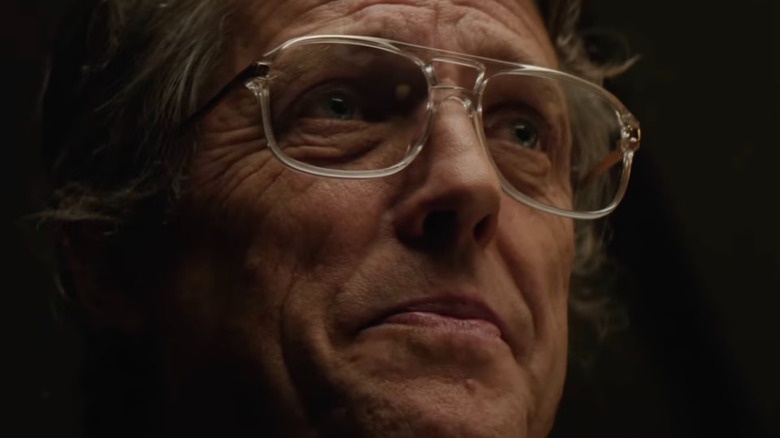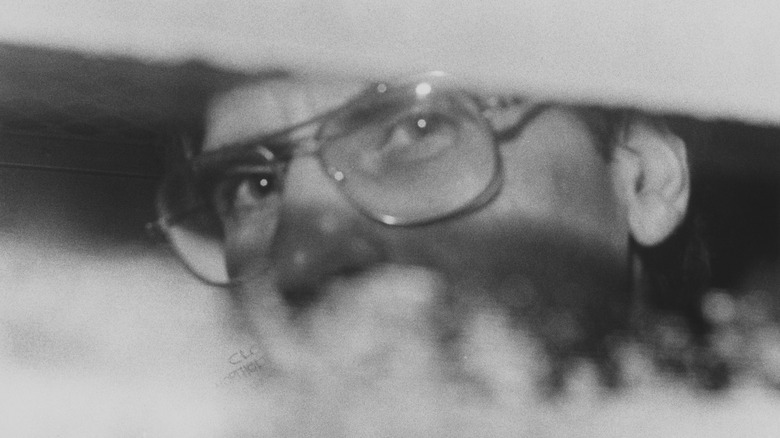The Real Life Serial Killer Hugh Grant Researched For Heretic
Spoilers for "Heretic" follow.
Does November count as part of spooky season? No matter your answer, one of 2024's best new horror movies has just debuted post Halloween. It's Scott Beck and Bryan Woods' "Heretic." An easy label for the film is religious horror, but it's not quite the same as "Rosemary's Baby" or, more recently, the twin "pregnant with the antichrist" pictures "Immaculate" and "The First Omen."
"Heretic" is a horror film about religion, where the characters are discussing their faiths and the history of them. At least half of the dialogue in the script must belong to the villain, Hugh Grant's Mr. Reed. A theology academic turned serial killer, Reed gets his newest playthings when two Mormon missionaries (Sophie Thatcher and Chloe East) show up at his doorstep. Instead of letting the pair convert him, he gives them a course on "the one true religion."
If after the recent United States election you're struggling to muster up sympathy for Christian white girls, have no fear, because both Thatcher and East are compelling leads. It helps, though, that their performances are more so about listening and reacting than speaking themselves; no-one can steal attention away when Hugh Grant is using his quick tongue. In his "Heretic" review, /Film's Jacob Hall compared Grant's "Heretic" performance to Vincent Price; you could also say he's Anthony Hopkins' Hannibal Lecter if there was any warmth in the doctor's smile as he spoke to Clarice.
While speaking at a Q&A (with /Film in attendance), Grant was asked about how he crafted Mr. Reed. He admitted he "went down a big rabbit hole there" about real serial killers. One he name-dropped as a model for his part was Dennis Nilsen.
Mr. Reed in Heretic is modeled on the serial killer Dennis Nilsen
A Scotland-born Londonite, Dennis Nilsen was also known as the Muswell Hill Murderer. Between 1978 and 1983, he is known to have killed 12 men and boys, ultimately being convicted of six murders. (He was first discovered when remains of his victims were found in his apartment building's plumbing.) After confessing, Nilsen was sentenced to life in prison and he later died of natural causes in 2018.
Netflix (of course) produced a documentary about Nilsen: 2021's "Memories of a Murderer: The Nilsen Tapes." Grant's research, though, was Nilsen's biography "Killing For Company" (written by Brian Masters, who consulted with his subject). Grant said he believes that developing backstory is a crucial part of an actor's process: "I have a feeling that if you don't do that, you just smell pantomime baddie." For Mr. Reed, Grant decided he was probably as lonely as Nilsen claimed to be.
"['Killing For Company'] struck a chord with regard to this guy, because I always suspected he was the guy, the child in fact, who struggled to maintain friendships. And he was all right to start with. He had some good cards to play. He was quite charming or personable, but after a few days, kids just didn't invite him anymore. And I think he may have been quite bitter about that and upset and tried too hard to be even more interesting and iconoclastic and funny and a prankster. And you end up with that."
Many photos of Nilsen show him wearing thick-rimmed glasses — quite similar to the ones that Grant wears as Reed in "Heretic." Did he bring Nilsen's glasses to the movie? It's possible, but it'd be a mistake to think of Reed's glasses as some serial killer Easter egg. They're an important detail to Reed's characterization; he acts like a professor, literally lecturing Sisters Barnes (Thatcher) and Paxton (East), then pushing them with provocative questions to give them room to think. Notice he only whips out the glasses once he's ready to begin his lesson.
The glasses also complement Reed's sweater, and form an outfit which reinforces how he's a "harmless" intellectual. As a joke in the movie itself notes, his name is a homophone for "read."
"Heretic" is now playing in theaters.

